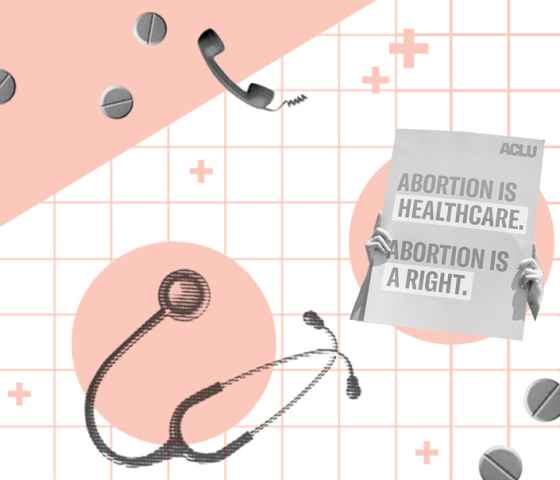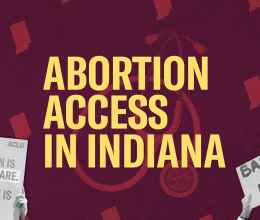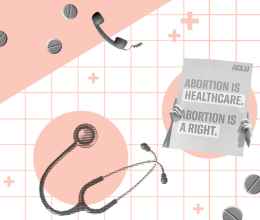Abortion Ban
Anonymous Plaintiffs 1-5; Hoosier Jews for Choice v. The Individual Members of the Medical Licensing Board of Indiana, et al. (September 2022)
This is a class action lawsuit claiming that Senate Enrolled Act 1 (S.E.A. 1), a ban on abortion, violates Indiana’s Religious Freedom Restoration Act (RFRA). The lawsuit was filed on behalf of Hoosier Jews for Choice, and five women who, like many Hoosiers, have sincere religious beliefs that they must be able to obtain an abortion under circumstances prohibited by S.E.A. 1. This is the second lawsuit we've filed to block the ban in court.
Status: A preliminary injuction has been granted. On April 4, 2024, the Indiana Court of Appeals affirmed the injunction and also affirmed the trial court’s ruling that the case should proceed as a class action.
Planned Parenthood Great Northwest, Hawai'i, Alaska, Indiana, Kentucky, Inc. et al. v. Members of the Medical Licensing Board of Indiana et al. (August 2022)
This case challenges Senate Enrolled Act 1 (S.E.A. 1), Indiana's ban on abortion, claiming the ban violates the Indiana Constitution's right to privacy and equal privileges protections. The law bans virtually all abortions in Indiana, with a few extraordinarily narrow exceptions. This is one of two lawsuits we've filed to block the ban in court.
Status: The Court overturned the preliminary injunction order which had previously blocked the law. THIS LAW IS CURRENTLY IN EFFECT.
- In November 2023, we filed a new lawsuit seeking a preliminary injunction to broaden the scope of the narrow and ambiguous health and life exception to Indiana's abortion ban. In September 2024, an Indiana circuit court declined to broaden and clarify the scope of the exception, despite ample evidence that it prevents Indiana physicians from providing critical abortion care to patients.
Read more
TRAP Law: Method Ban
Caitlin Bernard, M.D. v. Individual Members of the Indiana Medical Licensing Board; and The Marion County Prosecutor (April 2019)
This case challenges HEA 1211, which attempts to ban the most common form of abortion used after the first trimester, dilation and evacuation. This method of abortion is used because of its proven record through years of research and medical practice as a safe and effective medical procedure.
Status: The Court overturned the preliminary injunction order which had previously blocked the law and the case will proceed. THIS LAW IS CURRENTLY IN EFFECT.
TRAP Law: Provider Requirements
Planned Parenthood of Indiana and Kentucky, Inc. v. Commissioner, Indiana State Department of Health (April 2018)
This case challenges provisions of SEA 340, which requires medical providers to report “all abortion complications.” Additionally, the law requires that abortion clinics be inspected annually for licensure, as opposed to hospitals and ambulatory surgical centers that can be inspected every other year. The law violates due process and equal protection by singling out abortion providers and requiring invasive reporting that has nothing to do with protecting women’s health.
Status: The Court overturned the preliminary injunction order which had previously blocked the law and the case will proceed. THIS LAW IS CURRENTLY IN EFFECT.
Restrictions on Minors
Planned Parenthood of Indiana and Kentucky, Inc. v. Commissioner, Indiana State Department of Health (May 2017)
This case challenges portions of SEA 404 which would amend Indiana law to provide that, in a bypass proceeding where a minor can seek judicial permission to obtain an abortion without parental consent, the court can order that notice be provided to the parent.
Status: The Court overturned the preliminary injunction order which had previously blocked the law and the case will proceed. THIS LAW IS CURRENTLY IN EFFECT.
TRAP Law: Forcing Providers to Present Misinformation
All-Options v. Attorney General of Indiana (2021)
A federal district court blocked an Indiana measure forcing health care providers to share false and misleading information with their patients about “reversing” a medication abortion, a false claim that may lead some patients to end a pregnancy based on the mistaken belief that its effects can later be undone. The case is currently scheduled for trial in August 2023.
Status: The Court granted a preliminary injunction blocking the law and the case will proceed. THIS LAW IS CURRENTLY BLOCKED.






